Chauvin sentenced to 22.5 years in Floyd murder
Judge Peter Cahill sentences Chauvin to 22.5 years for murder of George Floyd, citing aggravating factors.
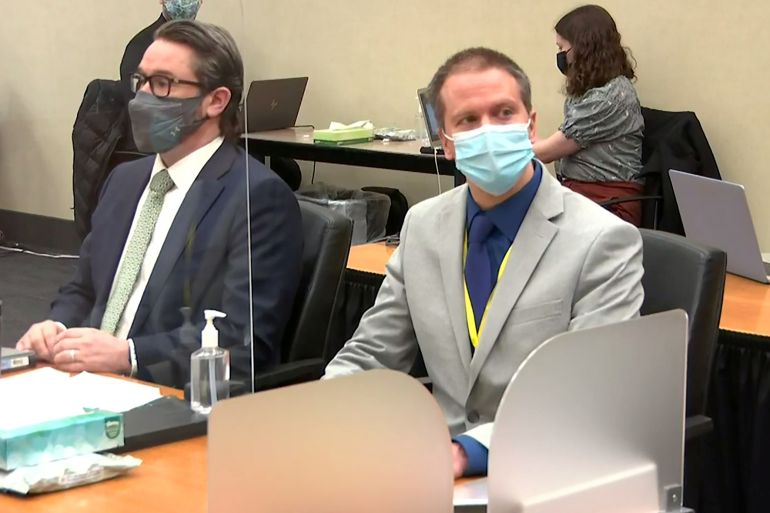
A judge on Friday sentenced former Minneapolis Police officer Derek Chauvin for murdering George Floyd last year.
- Chauvin, 45, sentenced to 22.5 years for second-degree murder of Floyd.
- Chauvin, who is white, held his knee on the neck of Floyd, who was Black, for more than nine minutes on May 25, 2020. Floyd’s death was recorded by onlookers and widely shared, sparking an international protest movement against police brutality and racism.
- Judge Peter Cahill found four aggravated sentencing factors in the case, including that Chauvin treated Floyd with particular cruelty, abused the power of a police officer, killed him with the participation of three or more other people, and that the murder occurred in front of minors.
- The charge carries a maximum of 40 years, though Minnesota sentencing guidelines recommended Chauvin be sentenced to 12.5, given he has no criminal record. Prosecutors had asked for 30 years.
Here were the latest updates, as they happened:
Keep reading
list of 3 itemsMinneapolis braces for Derek Chauvin’s sentencing in Floyd case
Neo-Nazi group defaces George Floyd statue in New York City
Minnesota ACLU applauds sentencing, says ‘re-examination’ of policing must happen
Ben Feist, chief programs officer of the ACLU of Minnesota, said in a statement that “for the first time in state history, a white officer will face prison time for murdering a Black man.”
Feist noted the “systems that led to Mr. Floyd’s murder by police are still intact, and police are still on track to kill 1,000 people this year.
“We must re-examine our entire system of public safety and public health, and root out the racism that pervades law enforcement.”
Feist went on recommend police be removed “from low-level enforcement and divert money toward community-based services such as crisis-response teams”, echoing calls from sections of the Defund the Police movement.
Crump, Sharpton call for ‘federal’ reform
Floyd family lawyer Ben Crump standing outside the Minneapolis court house thanked millions of Americans who echoed the family’s calls for justice.
“This is the longest sentence that a police officer has ever been sentenced to, in the history of the state of Minnesota. But this should not be the exception when a Black person is killed by brutality by police. It should be the norm.”
Crump shouted to the crowd “Say his name.”
22.5 YEARS! This historic sentence brings the Floyd family and our nation one step closer to healing by delivering closure and accountability.
— Ben Crump (@AttorneyCrump) June 25, 2021
“George Floyd”, they shouted in response.
Crump called on the Senate to pass the George Floyd Justice in Policing Act, a civil rights and police reform bill.
Reverend Al Sharpton said “this is the longest sentence they’ve ever given, but it’s not justice because George Floyd is not alive”.
Sharpton said the civil rights movement would not rest until police reform happened on the “federal” level.
Minnesota Attorney General Keith Ellison says conviction is chance for reform
Minnesota Attorney General Keith Ellison, whose office prosecuted Chauvin, applauded the sentencing on Friday.
Ellison, a progressive prosecutor, said the former police officer’s conviction and sentencing give the US a “choice to break the old paradigm and end the the cycle of inaction. The choice to act for accountability and justice. The choice to transform ourselves in our country.”
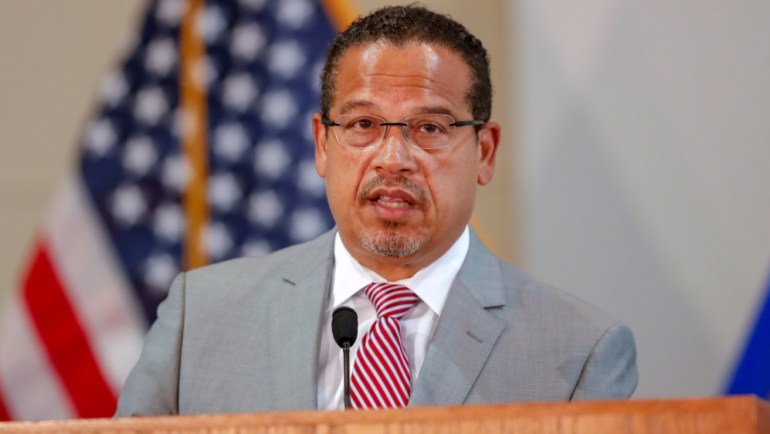
Ellison has voiced support for police reform legislation. He said that for the sake of the “terrible sacrifices that too many families like the Floyd’s have had to make. And for the sake of the many officers who strive to serve and protect, with dignity and honor and high standards. And for the sake of the community. Time is up. It’s time to act.”
Verdict ‘inconsistent with justice in the US’
Ronald Sullivan, the faculty director of the Harvard Criminal Justice Institute, said he believed it was unlikely the judge would have given a sentence less than the maximum if he had sentenced a Black man with killing a police officer.
It’s “inconsistent with the way justice is supposed to happen in the United States, but it’s the reality,” Sullivan told Al Jazeera.
When asked about the appropriate steps forward, Sullivan replied: “I think that citizens across the country in the US have to keep their foot on the gas pedal … they have to continue to press their politicians for significant police reform.
“We in the United States see this case as a beginning and not an end,” he concluded.
Chauvin sentenced to 22.5 years for murder of George Floyd
Judge Cahill sentenced Chauvin to 22.5 years for the murder of George Floyd on Friday.
Cahill said the “sentence is not based on emotion, or sympathy, but at the same time I want to acknowledge the tremendous pain that all the families are feeling – especially the Floyd family. You have our sympathies.”
Cahill said a 22-page legal analysis of over would accompany the sentence.
Chauvin extends condolences to Floyd family
Former Minneapolis Police officer Derek Chauvin extended his condolences to George Floyd’s family in court on Friday.
Chauvin denied the chance to speak at his sentencing hearing, saying pending legal matters prevented him from doing so. “Briefly, though, I do want to give my condolences to the Floyd family.”
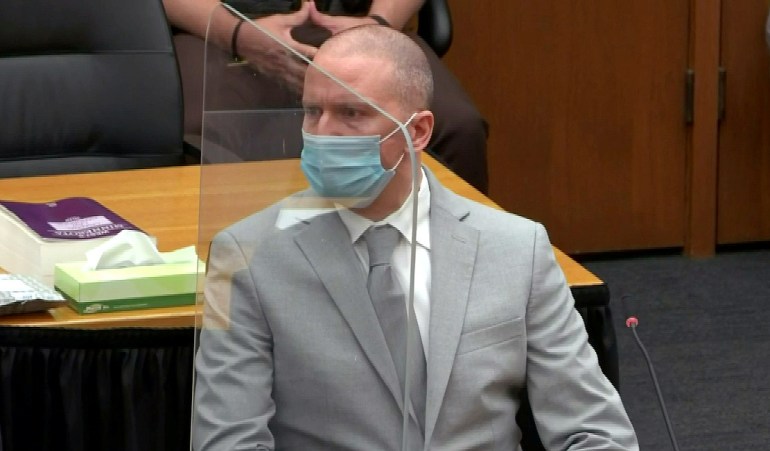
Chauvin said there is “going to be some other information in the future that would be of interest. And I hope things will give you some peace of mind. Thank you.”
The judge then called a recess to complete the sentencing documents.
‘People will be unhappy’: Chauvin lawyer
Chauvin lawyer Eric Nelson says the case “at the epicentre of a cultural and political divide” and says no matter the sentence, people will be unhappy.
“There are a great number of people who will do any sentence to pronounce this over overly the headings sufficient to satisfy justice. But there are an equal number of people who will view any sentence you pronounce as draconian or overbearing. Either way, some percentage of the public view your sentence as a miscarriage of justice.”
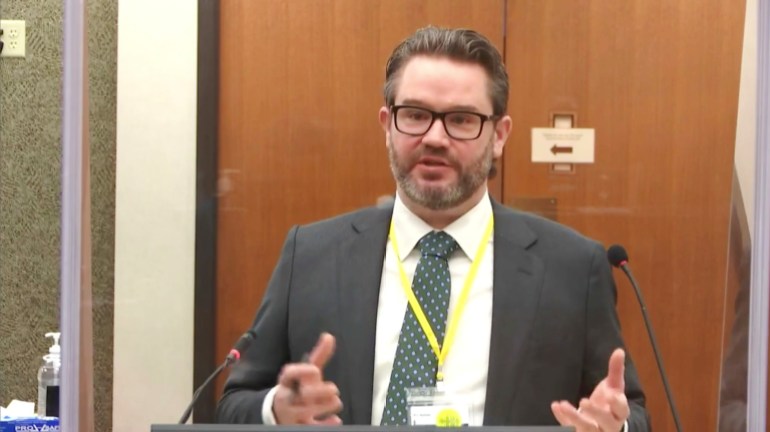
Nelson said he did not want to relitigate the case, or question the facts.
He described Chauvin as a good officer, and “he is a son, a brother and a father, a friend”.
Nelson asked the judge consider not only the aggravating factors, but also the mitigating factors. Chauvin did not come into this trial as a “career criminal” but lives “an honourable life”.
‘You will be sentencing me’: Chauvin’s mother
Carolyn Pawlenty, Chauvin’s mother, addressed the court following Floyd’s family.
“When you sentence my son, you will also be sentencing me,” Pawlenty said. “I will not be able to see Derek, talk to him on the phone or give him our special hug.”
Floyd’s family has repeatedly referred to the fact they will never see him again. His family testimony started with his seven-year-old daughter saying she asks “about him all the time.”
Floyd’s brother asks judge for maximum sentence
Floyd’s brother Terrence Floyd addressed Chauvin directly during his victim impact statement on Friday.
Referencing the video of Chauvin with his knee on Floyd’s neck, Terence asked: “What was going through your head as you had your knee on my brother’s neck?”
Terence told Judge Cahill he wanted the maximum sentence. “We don’t want to see no more slaps on the wrist. We’ve been through that already.”
Chauvin used excessive force ‘with a smirk on his face’: Philonese Floyd
George Floyd’s brother, Philonese Floyd, testified in court on Friday that Chauvin “had no regard for human life” as he left his knee on Floyd’s neck.
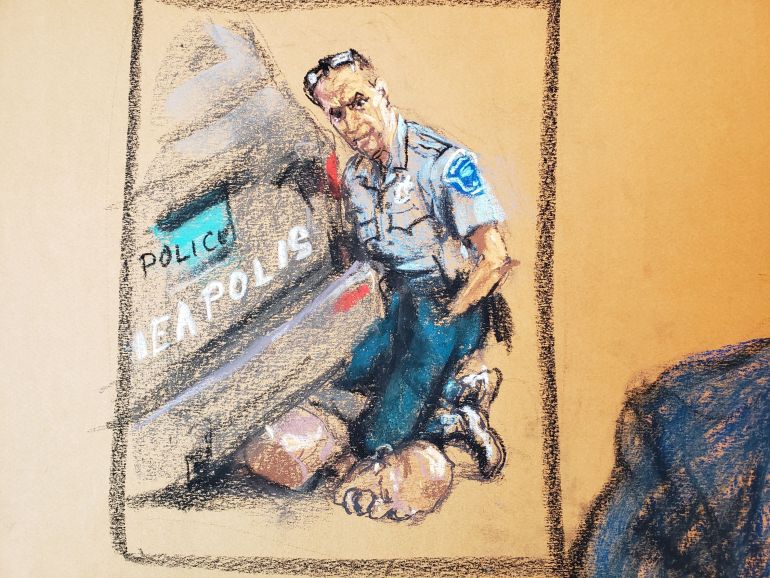
Chauvin used excessive force “with a smirk on his face”, Philonese said, holding back tears, at Chauvin’s sentencing hearing.
Floyd’s family had previously expressed anxiousness at testifying in the hearing.
George Floyd’s daughter begins family testimony
Prosecutors asked several members of Floyd’s family to address Hennepin County District Judge Peter Cahill as the hearing got underway. Floyd’s 7-year-old daughter Gianna began, appearing in a video recording played for the judge.
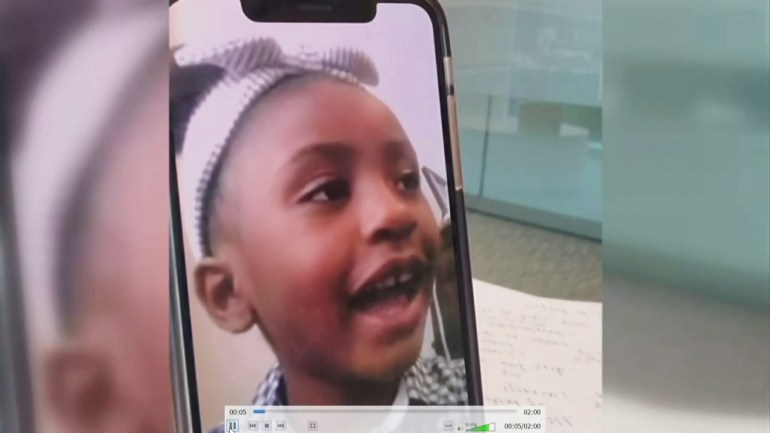
“I ask about him all the time,” she said in the video as Chauvin sat before the judge dressed in a gray suit and tie, a blue medical mask covering his nose and mouth.
“My daddy always used to help me brush my teeth.” Asked what she would say to him if she could see him again, she said: “It would be I miss you and I love you.”
Jacob Blake’s uncle shows support
Al Jazeera’s Cinnamon Janzer reported this from Minneapolis:
On a warm and sunny summer day with minimal security and no police presence, a handful of people began gathering on a small plaza outside the Hennepin County Government Center that serves as the courthouse.
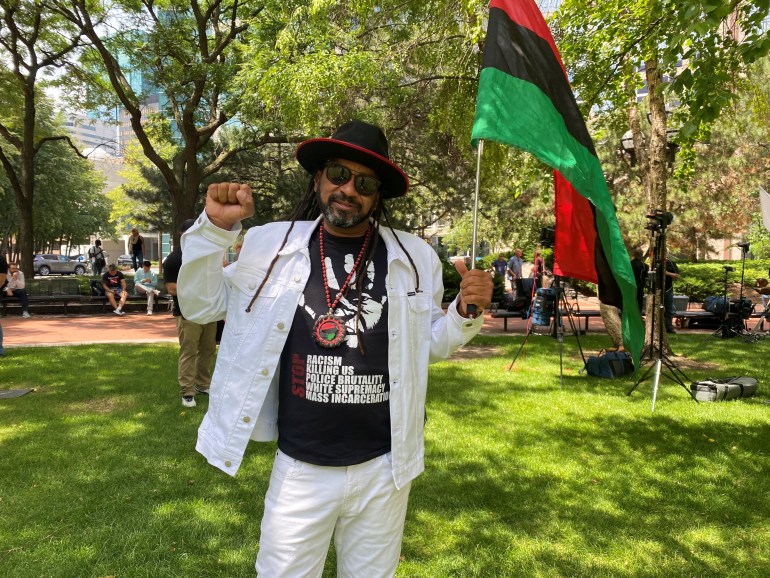
Standing under a the shade of a crop of trees is Justin Blake, the uncle of Jacob Blake who was shot by police in Kenosha, Wisconsin last August. He drove up with his brother and Jacob’s father drove up from Chicago early this morning, arriving at the plaza an hour ago. “We’re here to support the Floyd family,” he told Al Jazeera.
Blake said the past year has made the US mature and institutional change needs to take place.
“We’re talking about reparations all over the nation now. We’re a mature, sophisticated county at this point and we can talk about some serious issues. … We want to go into this next millennium with these things straight.”
Floyd family ‘anxious’ ahead of testimony
Ben Crump, a lawyer for Floyd’s family, told the Associated Press relatives were “anxious and tense” ahead of the sentencing.
“To us, George Floyd is a cause. He’s a case. He’s a hashtag. To them – that’s their flesh and blood. You know, that that’s their brother,” Crump said.
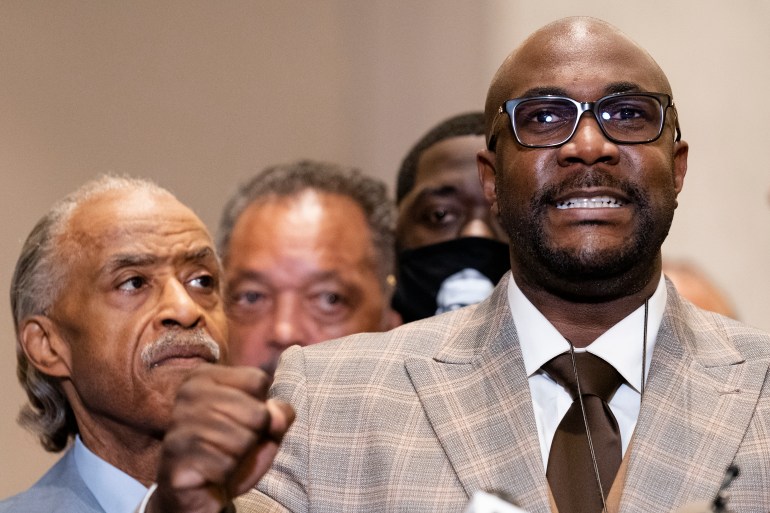
It remains unclear whether Chauvin, who did not testify at his own trial, would take the opportunity to speak at his sentencing.
Chauvin is also awaiting trial on federal civil rights charges in Floyd’s death, along with three other fired officers who have yet to have their state trials.
‘Nothing typical’ about Floyd’s death: lawyer
Floyd family lawyer Ben Crump said there “was nothing typical about what Derek Chauvin did in torturing George Floyd to death” and he and the family “don’t expect it to be a typical sentence”.
No amount of sentencing time will bring back George Floyd, but it can help us get closer to achieving equal justice and accountability. America is ready for its racial reckoning! We MUST seize this moment to keep moving forward to a better future! pic.twitter.com/xmPrYbqb9J
— Ben Crump (@AttorneyCrump) June 25, 2021
Crump and members of Floyd’s family have made numerous appearances at rallies – and funerals – of other Black people killed by police in the past year. They hope Chauvin’s sentence will set a precedent for killer cops, much like his conviction.
“It needs to be a sentence that sets a new precedent for holding police officers accountable for the unjustifiable killings of Black people in America,” Crump told the AP.
Judge denies request for new trial
On Thursday Judge Peter Cahill denied (PDF) Chauvin’s request for a new trial saying he had failed to demonstrate that he was deprived of his constitutional right to a fair trial.
Chauvin had alleged the Court abused its discretion and that the State engaged in prosecutorial misconduct, and asked for a Schwartz hearing to determine if there had been outside influence on the jury.
Cahill wrote that Chauvin had failed to establish a case of juror misconduct, or that a juror made false testimony. He denied both motions for a new trial and Schwartz hearing.